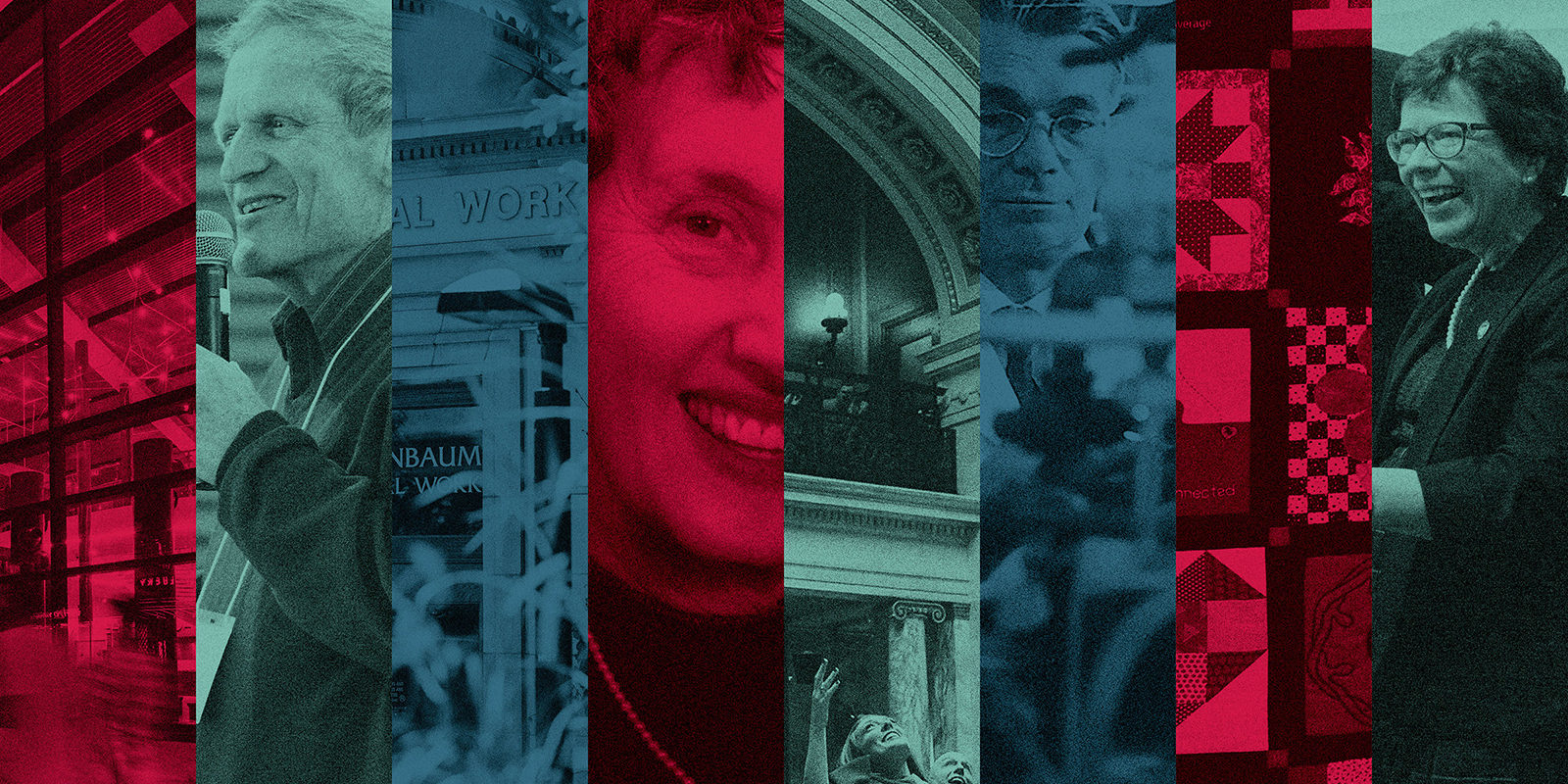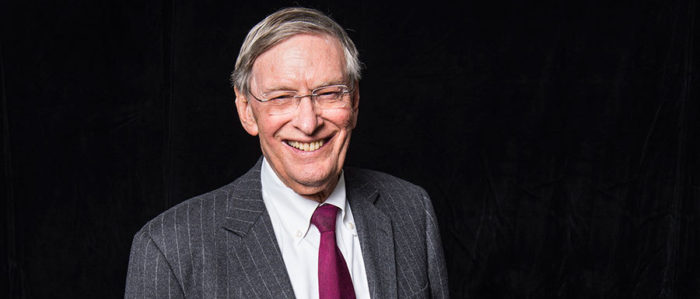This story appeared in the Fall 2021 Letters & Science magazine.
At the beginning, the goal seemed almost beyond reach: Raise $500 million for L&S as part of the university’s ambitious All Ways Forward campaign. Six years later, L&S surpassed that goal, thanks to thousands of supporters who believed in a world-class educational experience for our students. The gifts of many helped us realize this vision of excellence, but along the way there were moments that made us catch our breath as transformative change unfolded in real time. We extend deepest gratitude to those whose extraordinary generosity helped turn dreams into reality. Their profound impact on our campus, and on the lives of our students, will be felt long into the future.

SHAPING THE FUTURE
In 2015, John and Tashia Morgridge announced their $100 million lead gift to the All Ways Forward comprehensive campaign. Representing the largest single contribution from individual donors in the history of the institution, the gift was structured to match donations for new and enhanced professorships, chairs and distinguished chairs.
“This extraordinary gift, and the gifts it will inspire, will shape UW’s future in ways we cannot even foresee right now,” said Chancellor Rebecca Blank. Her words proved prescient. The “Morgridge Match” has helped to create 90 different professorships and distinguished chairs in L&S alone, across 25 departments. In the past, the Morgridges’ generosity helped shape the Morgridge Institute for Research, the School of Education and the Wisconsin School of Business. In February 2020, the Morgridges announced another $70 million matching opportunity to support faculty recruitment and retention. Their most recent pledge: $125 million to help fund a new headquarters for the School of Computer, Data, & Information Sciences—$50 million of which is in the form of a challenge grant to double the impact of other donors’ gifts. Along with $50 million from the Wisconsin Alumni Research Foundation (WARF), the new CDIS building will energize a new “tech corridor” in the heart of campus.

GIFT OF LOVE
Joel Berman’s love for his wife, Sandra Rosenbaum, has transformed the School of Social Work at UW-Madison. Three years ago, Berman, a member of the Letters & Science Board of Visitors, approached the school’s leadership to fulfill a promise he’d made to his wife of 27 years. Sandra, who received her graduate degree in social work from UW-Madison in 1976, wanted him to donate to the school to put dedicated, well-trained social workers into the field quickly while reducing the financial barriers to earning the degree. When Sandra passed away that summer, Berman created a scholarship in her name and that of her mother, Harriet, a New York social worker who had inspired Sandra’s love of the field. He wasn’t done. In June 2020, Berman fulfilled his promise to his wife and then some, donating the largest gift in the school’s history to rename the school the Sandra Rosenbaum School of Social Work, placing it among an elite group of top named social work programs in the country.
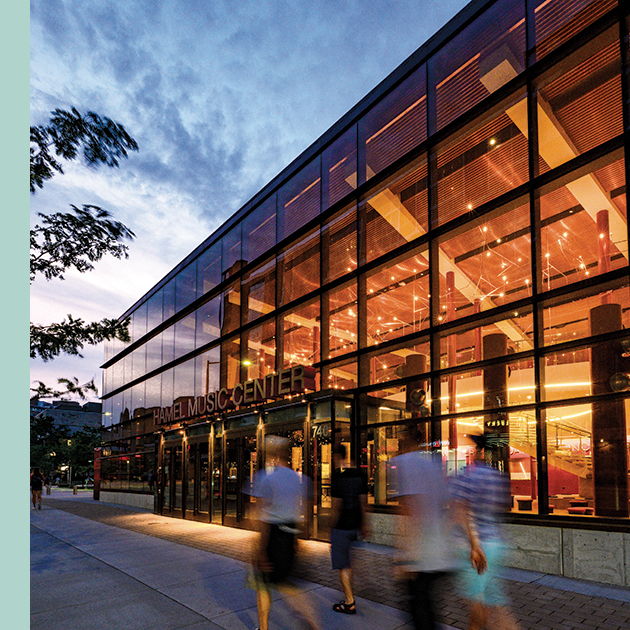
MUSIC TO OUR EARS
It began with the dream of a “campus arts corridor,” anchored by the Chazen Museum and a world-class performance venue where visiting artists could appear and where UW’s music students—long confined to the basement of the humanities building—could practice, learn and perform. Pamela Hamel and her husband, George (BA, Communication Arts, ’80), stepped forward with a naming gift, and the Mead and Witter families from Wisconsin Rapids offered critical support, enabling the new music venue to be built in one phase. The Hamel Music Center, designed by Holzman Moss Bottino Architecture, in partnership with local firm Strang and with acoustic design by Talaske/Sound Thinking of Oak Park, Illinois, opened in October 2019. Featuring the Sing Man & Florence Lee/Annette Kaufman Rehearsal Hall, the 650-seat Mead Witter Foundation Concert Hall, and the 315-seat Collins Recital Hall, the HMC enjoyed a triumphant first season. Director of Bands Scott Teeple calls the space a “state-of-the-art musical lab.” The interior color scheme reflects Wisconsin’s natural landscape: the blue lakes and the rich plums and golds of the maple leaf, our state tree. “It is the Wisconsin Idea made audible,” declared Susan Cook, director of the newly named Mead Witter School of Music.
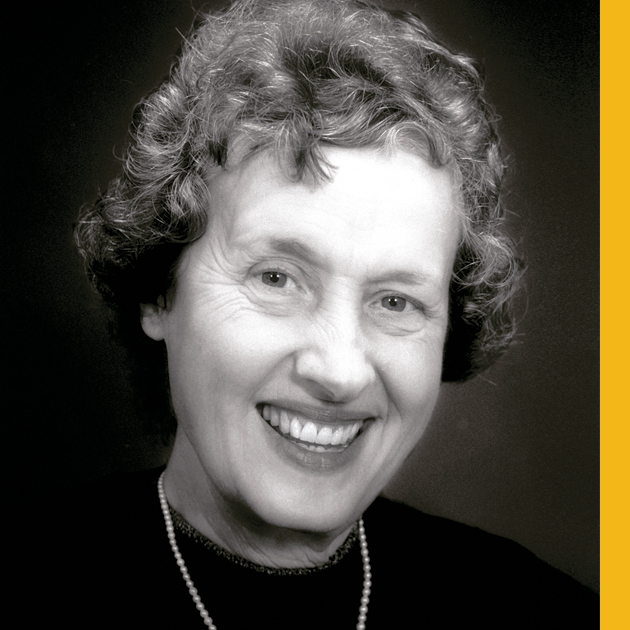
PIONEERING SPIRIT
When Mary Herman Rubinstein earned her MD from UW-Madison in 1960, she was one of four women in her medical school class. Her path to science started when she was a child surrounded by nature, and by age 12, she was picking out insects from mud samples at the research lab and thinking about medical school. After earning her MD, Rubinstein served as the sole female intern at a hospital affiliated with Dartmouth College before returning to Madison for a residency in neurology, then on to Stanford where she helped build up a new neuropathology program with her husband, Lucien Rubinstein. She eventually joined a team at the National Institute of Mental Health in schizophrenia research. After retiring, Rubinstein returned to Madison. She passed away in 2017, but not before establishing the inaugural chair in neuroscience at the UW School of Medicine and Public Health and endowing up to seven professorships in Letters & Science. “Everything about her life speaks to creativity and resilience and being unafraid to change course,” says Anne Pringle, the first Letters & Science Mary Herman Rubinstein Professor of Botany. “I am glad to honor her legacy.”
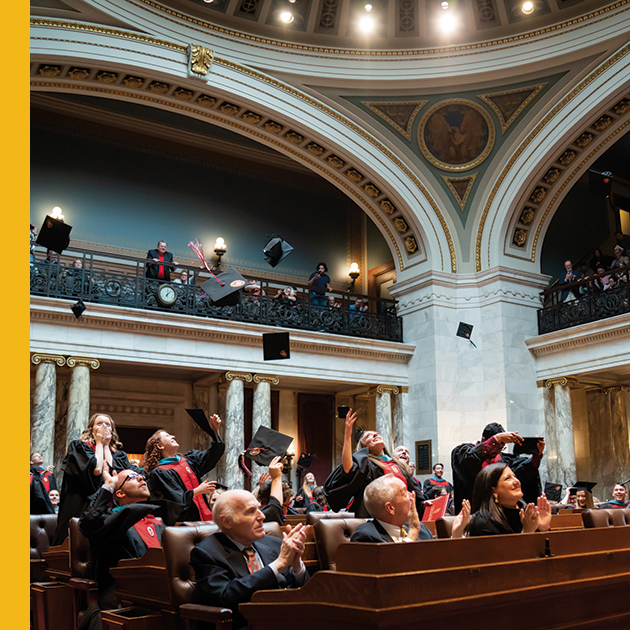
TRAINING FUTURE LEADERS
Representing Wisconsin in the U.S. Senate for 24 years, Herb Kohl demonstrated his deep commitment to public service and his ethos of civility in public debate and policymaking. In May 2019, he extended that legacy by announcing a $10 million gift from Herb Kohl Philanthropies to the University of Wisconsin-Madison’s La Follette School of Public Affairs.
The Kohl Initiative is the largest donation in the La Follette School’s history and allows the school to support undergraduate public policy internship opportunities, increase partnerships with nonpartisan organizations, host conferences on critical policy topics, and teach more high-demand classes in areas such as public and nonprofit leadership, economic development and social entrepreneurship. “Our democracy is being threatened by bitter partisanship, and the La Follette School is poised to lead by example—fostering cooperation, respectful discourse and service to others,” said Kohl, who was a founding member of the La Follette School’s Board of Visitors. In 2016, Kohl’s $1.5 million donation to the La Follette School launched the Herb Kohl Public Service Research Competition, supporting collaborative faculty–student research.

CAREER SUCCESS
In 2014, then–L&S Dean Karl Scholz set forth an ambitious goal: to completely transform how we prepare every liberal arts student—not just the highly motivated or well-connected few—for success after graduation. Today, a busy, thriving career center inspires L&S students to identify their passions, network with alumni and connect with employers. SuccessWorks was launched with a significant proportion of private funding and continues to increase its impact on students’ lives thanks to generous donors. Experts from peer universities have toured SuccessWorks to learn more about best practices, which include Career Communities anchored by dedicated advisors who empower students to explore clusters of occupations like Business & Entrepreneurship or Tech, Data & Analytics. During the COVID-19 pandemic, SuccessWorks advisors and staff have connected students with remote job opportunities, as well as micro-internships and short-term projects. Associate Dean and Executive Director of SuccessWorks Rebekah Pryor Paré said the pandemic has highlighted what SuccessWorks was created to do. “We are very invested in how our students are taking advantage of their education. Whether they are heading to graduate school or entering the world of work, we have services that support them,” she told Wisconsin Public Radio in spring 2020.
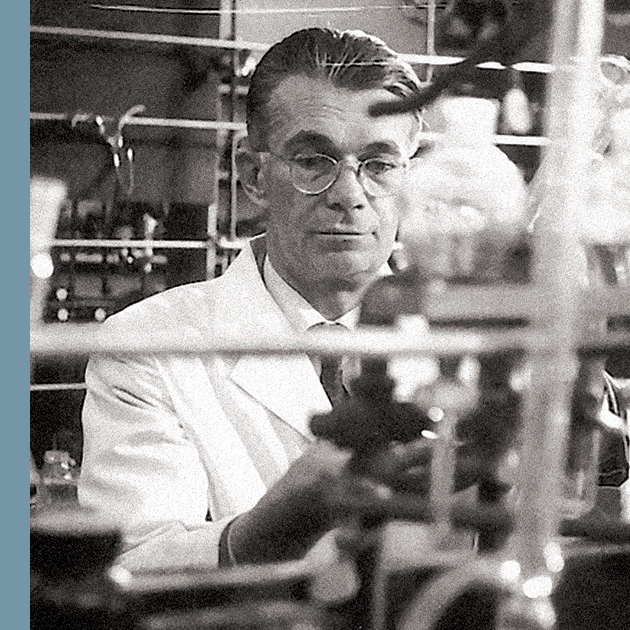
SUPPORTING SCIENCE
His name is synonymous with science on campus, and Wayland Evan Noland supports the College of Letters & Science to ensure that intellectual pursuit remains strong into the future. As an undergraduate at UW-Madison, Noland took a wide range of classes. “I had a splendid run of teachers in all different areas,” he said, including his own father, Lowell E. Noland, for whom Noland Hall (home to the Department of Integrative Biology) is named. After a stint in the Army as a medic, Noland earned a master’s degree and a PhD in chemistry at Harvard University and began a 64-year career as a professor of chemistry at the University of Minnesota. To ensure that future generations enjoy the high quality of teaching and the excitement of discovery that set Noland on his life’s path, he established distinguished chairs in the areas of chemistry, integrative biology and limnology, and contributes funds to help those units support student research. “He is an amazing alumnus who embodies the Wisconsin Idea,” says Jake Vander Zanden, the director of UW’s Center for Limnology and a recipient of one of the three Wayland E. Noland Distinguished Chairs.

CHAMPIONING HUMANITIES
No funding entity has done more for the humanities at UW-Madison than the Andrew W. Mellon Foundation. Responding to multiple bold proposals from UW’s Center for the Humanities, the foundation granted support for innovative programming, faculty excellence and a radical re-envisioning of the humanities that focused on public outreach and shared learning. Four new professorships—as well as a distinguished chair in ancient Greek philosophy—opened interesting fields of study and enabled departments to offer a “constellation” of linked courses, one of the high-impact practices that enrich the student experience here. Mellon funds helped create the Public Humanities Exchange for Undergraduates to help students connect their humanities scholarship with the community. Another new initiative, Engaging the Humanities, created public humanities graduate fellowships; launched the UW’s first-ever graduate certificate in the public humanities; and offered a chance for faculty in the humanities to reorient their work to reach audiences outside of the university. In January 2017, with support from the Mellon Foundation, the Consortium of Humanities, Centers & Institutes (CHCI) moved to UW-Madison. CHCI includes 220 members from 25 countries, and its relocation to Madison from Duke University amplifies the spotlight on humanities outreach and scholarship here.
